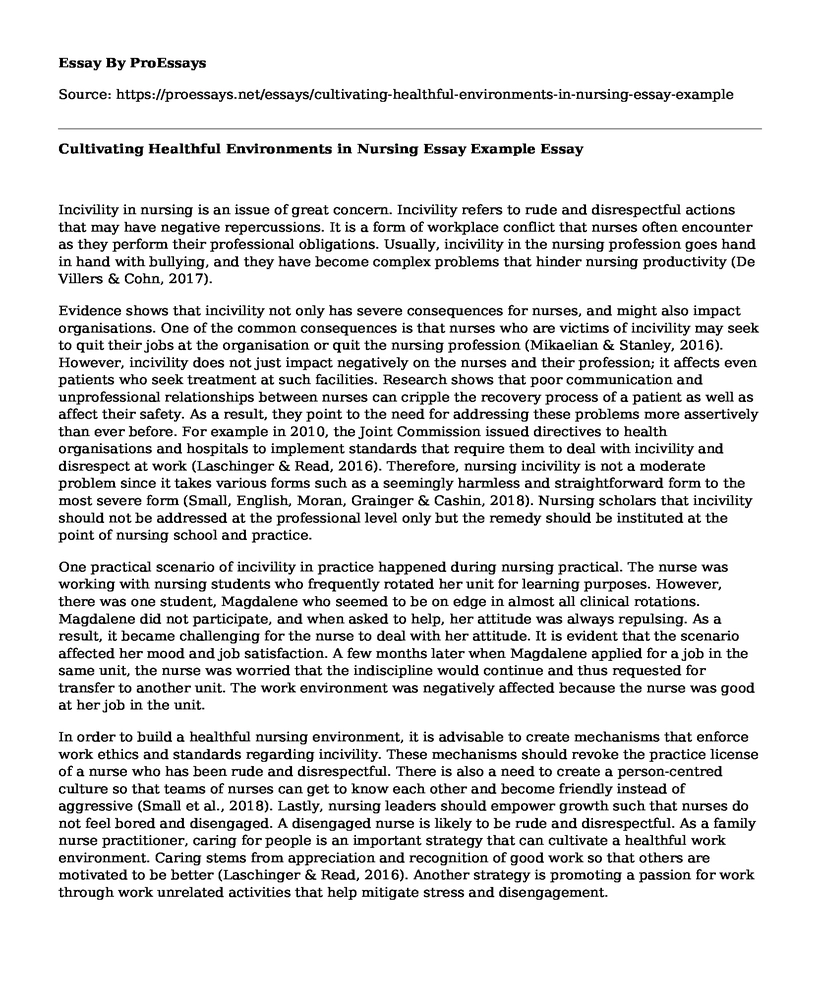Incivility in nursing is an issue of great concern. Incivility refers to rude and disrespectful actions that may have negative repercussions. It is a form of workplace conflict that nurses often encounter as they perform their professional obligations. Usually, incivility in the nursing profession goes hand in hand with bullying, and they have become complex problems that hinder nursing productivity (De Villers & Cohn, 2017).
Evidence shows that incivility not only has severe consequences for nurses, and might also impact organisations. One of the common consequences is that nurses who are victims of incivility may seek to quit their jobs at the organisation or quit the nursing profession (Mikaelian & Stanley, 2016). However, incivility does not just impact negatively on the nurses and their profession; it affects even patients who seek treatment at such facilities. Research shows that poor communication and unprofessional relationships between nurses can cripple the recovery process of a patient as well as affect their safety. As a result, they point to the need for addressing these problems more assertively than ever before. For example in 2010, the Joint Commission issued directives to health organisations and hospitals to implement standards that require them to deal with incivility and disrespect at work (Laschinger & Read, 2016). Therefore, nursing incivility is not a moderate problem since it takes various forms such as a seemingly harmless and straightforward form to the most severe form (Small, English, Moran, Grainger & Cashin, 2018). Nursing scholars that incivility should not be addressed at the professional level only but the remedy should be instituted at the point of nursing school and practice.
One practical scenario of incivility in practice happened during nursing practical. The nurse was working with nursing students who frequently rotated her unit for learning purposes. However, there was one student, Magdalene who seemed to be on edge in almost all clinical rotations. Magdalene did not participate, and when asked to help, her attitude was always repulsing. As a result, it became challenging for the nurse to deal with her attitude. It is evident that the scenario affected her mood and job satisfaction. A few months later when Magdalene applied for a job in the same unit, the nurse was worried that the indiscipline would continue and thus requested for transfer to another unit. The work environment was negatively affected because the nurse was good at her job in the unit.
In order to build a healthful nursing environment, it is advisable to create mechanisms that enforce work ethics and standards regarding incivility. These mechanisms should revoke the practice license of a nurse who has been rude and disrespectful. There is also a need to create a person-centred culture so that teams of nurses can get to know each other and become friendly instead of aggressive (Small et al., 2018). Lastly, nursing leaders should empower growth such that nurses do not feel bored and disengaged. A disengaged nurse is likely to be rude and disrespectful. As a family nurse practitioner, caring for people is an important strategy that can cultivate a healthful work environment. Caring stems from appreciation and recognition of good work so that others are motivated to be better (Laschinger & Read, 2016). Another strategy is promoting a passion for work through work unrelated activities that help mitigate stress and disengagement.
Conclusion
In conclusion, incivility is a big problem in nursing that affects not only individual nurses but also organisations and their patients. Therefore, there is a need to address the issue because it poses serious consequences such as loss of productivity and lack of trust and quick recovery from patients. Instead, nursing leaders should institute enforcement mechanisms that promote work ethics, promote a work centred culture and also empower growth so that nurses do not stagnate in their work units. These strategies can help create healthy environments without indiscipline or rudeness.
References
De Villers, M. J., & Cohn, T. (2017). Performance Potential Special: Incivility in nursing practice. Nursing management, 48(10), 42-51.
Laschinger, H. K. S., & Read, E. A. (2016). The effect of authentic leadership, person-job fit, and civility norms on new graduate nurses' experiences of coworker incivility and burnout. Journal of Nursing Administration, 46(11), 574-580.
Mikaelian, B., & Stanley, D. (2016). Incivility in nursing: from roots to repair. Journal of nursing management, 24(7), 962-969.
Small, S. P., English, D., Moran, G., Grainger, P., & Cashin, G. (2018). "Mutual Respect Would be a Good Starting Point:" Students' Perspectives on Incivility in Nursing Education. Canadian Journal of Nursing Research, 0844562118821573.
Cite this page
Cultivating Healthful Environments in Nursing Essay Example . (2022, Nov 20). Retrieved from https://proessays.net/essays/cultivating-healthful-environments-in-nursing-essay-example
If you are the original author of this essay and no longer wish to have it published on the ProEssays website, please click below to request its removal:
- Strokes in Older People Research Paper
- The Role of Organizational Culture and Its Influences Essay
- Research Paper on Amyotrophic Lateral Sclerosis
- The Use of Drugs in HIV-Positive Adults Paper Example
- Annoyances Essay Example
- Assessing the Job Seeker Paper Example
- Gaining a Competitive Advantage: How Businesses Make Money Selling Goods and Services - Essay Sample







